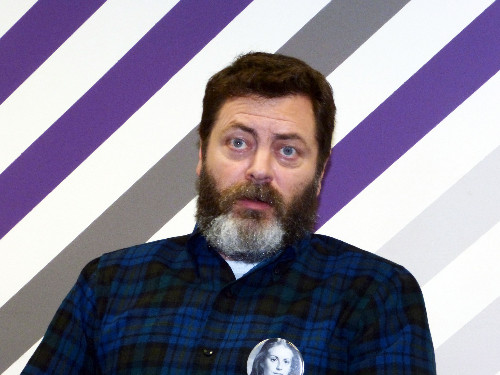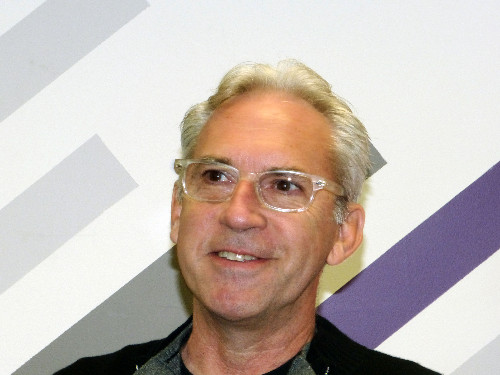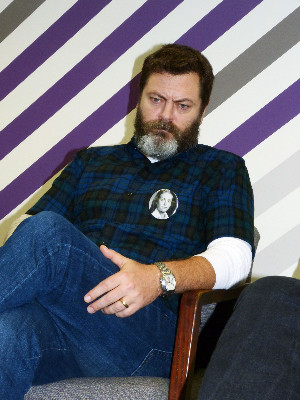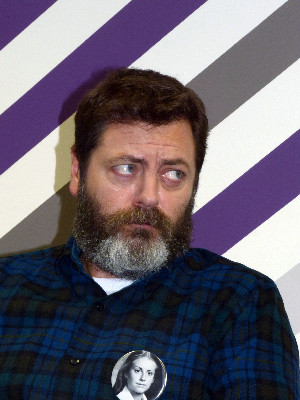A Confederacy of Dunces Slated for World Premiere
Creative Team Dicusses Production for Huntington Theatre Company
By: Charles Giuliano - Nov 01, 2015
From November 11 through December 13 Huntington Theatre Company will present a new play A Confederacy of Dunces adapted by Jeffrey Hatcher from the novel by John Kennedy Toole. It stars Nick Offerman as Ignatius and is directed by David Esbjornson.
A Confederacy of Dunces was published in 1980 eleven years after Toole's suicide. The novel earned a posthumous Pulitzer Prize for Fiction in 1981. The title references an epigraph from Jonathan Swift's essay, Thoughts on Various Subjects, Moral and Diverting: "When a true genius appears in the world, you may know him by this sign, that the dunces are all in confederacy against him."
Ignatius J. Reilly is an educated but slothful 30-year-old man living with his mother in the Uptown neighborhood of early-1960s New Orleans who, in his quest for employment, has various adventures with colorful French Quarter characters.
Recently there was a press conference with the playwright, director and leading actor.
Jeffrey Hatcher Six years ago Bob Guza (producer) called and asked if I wanted to work on an adaptation of A Confederacy of Dunces by John Kennedy Toole. I hadn’t read the book at the time. Some people absolutely love it and others not. The big trick was to find a dramatic story that we could tell on the stage. David (Esbjornson) and I started working on it very soon thereafter.
After a couple of workshops there was a back and forth and somebody suggested what about Nick Offerman? It’s been a long couple of years but we’re glad to be here.
David Esbjornson There is a challenge which I’ve never met before. There is an obligation to control the chaos in the novel in order to get it on the stage. You want to keep the spirit of that story alive. You must create the most interesting, eccentric and disparate cast possible. They all have to be these New Orleans dunces. They surround the main character who is arrogant, superior, obnoxious. He farts and belches and that’s the guy you want the audience to hang onto.
Nick Offerman You just said I was perfect casting.
DE I couldn’t think of anyone better. He’s also an incredibly funny character. There’s also a more delicate and sad little story inside of all that. What makes a person be like that?
At the center of the story is a very complex relationship between Ignatius and his mother. Not to explain him away. But to see what might have sent him into this eccentric personality; what he needs to do to protect himself. Because of what Nick is bringing to it audiences are going to be attracted to the main character. In that way we think that Nick is the perfect person for the role.
Nick Offerman The way things are going, if I play my cards right, I think I can roll this play right into the GOP candidacy. But more on that later. I’m incredible titillated. I went to school to do this and spent a lot of the 90’s in Chicago working in small regional theatres. I arrived at my manhood working at theatres like this.
Then I disappeared for awhile into the gutters of popular culture; continuing to do theatre in LA in a way that was apparently unremarkable. So to work on a book like this which is so near and dear to me as a lifelong weirdo and fan of counter culture, at such a venerable theatre company, is such a great privilege.
I came in for a fitting, my first fat suit fitting in the spring, and burst into tears. I was accosted by five ladies with measuring tapes. The tears were joyful.
But to work for a company where everything is done so completely with no pressure as it is for a television program. Having Jeffrey here continuing to adapt the material while we shit it out as it were. It’s been fun to be a part of this incredible ensemble. And my farting is getting good. I start great it’s stopping that’s tough.
DE Just as long as you get it right for opening night reviews. Anita Gillette plays your mother.
NO Anita and I did a film together. It’s called “Early Bird Special.” She tricks me and another unsavory guy. We pick them up in a breakfast joint. We plan to take them home and rob them. She kills me with a shovel to the face. I’ve been a huge fan of Anita since then.
Question Is the adapting still going on?
JH First you read the book. A lot of people don’t.
Q Really!
DE No. I’m teasing. You read the book a couple of times. I always have a couple of copies. One you tear out pages and circle things like “can use this. Dialogue here.” That kind of thing. Then there’s that period when you don’t look at the book at all. You hope that your reflexes are connected to the book. You cut things. You change things. You add things. You hope they’re in the voice thereof. Actors and others read the book and will sometimes point to a certain passage or say this is something to put back in. It was an amazing effort to distill the novel into something that could be performed.
Bob asked me who should adapt this and I said right out Jeffrey Hatcher. He’s so fluid and flexible in the rehearsal process. He’s able to make changes so quickly sometimes right on the spot. I don’t know a lot of writers who have that ability. When you’re in a process like this you test things and actors teach you things. Not to listen to the voices in the room is ridiculous because you can make it better. The actors have to respect what’s there and also ask for the things they need.
Q Nick can you talk about getting into your character?
NO Sure. I start with hot dogs. The fact that I am doing this role is still astonishing to me. Today I am surprised because I am know primarily for playing stentorian, beefy, insensitive men that they would imagine that I could play this simpering fop. I know that is completely what’s in my heart. Beneath this hairy skin I’m all fop. I do nothing but mince around the house.
In the 1990s with my company Defiant Theatre I had done a production of Ubu Roi. That had a fat suit and a mask. As I began to read the script for the workshop I said “Oh. This is my UBU channel. I’ve got this. That made this feel comfortable and I was less intimidated by the enormity of this project.
As an actor I am able to tap into part of the human condition. In truth we all have this whining child whose dog died. Pretty much I get up every morning, put on a clean pair of shorts and I’m good to go.
Charles Giuliano Mr. Hatcher talked about getting it right for the opening night. To develop a play there are weeks of rehearsal leading to the opening. Then the play is performed for a month or more after that. This is quite different from a TV or movie set where there is that day’s shooting and then the production moves on. There is quite a difference from theatre where the actors go on stage each night facing a new audience. How do you keep it fresh and surely the best performance is not likely to be opening night? So when is the best time to see the performance?
NO It’s a great question. When is the best performance? It depends upon the material and genre. During previews and even on opening night you’re going to have a raw energy that brings a sense of chaos or danger. It’s much more fun and exciting and may provide an energetic experience for the audience if the show has more circus elements. Then you get two months into the run and maybe the jugglers are getting a bit laissez faire.
If it’s Pinter or Chekhov the opposite could be true. You might take more time to see how to make the relationships sing. For myself I try to ignore that. I’ll do my best today and I’ll do my best on December 20th (last day of the run).
A great lesson I learned from my wife, among many, she’s a great teacher to me, Megan Mullally, she’s an actress. She also comes from Chicago theatre and has done a lot of Broadway work. We talk a lot about this.
I’ve done shows at Steppenwolf and Goodman in Chicago but I’ve never been in a Broadway run where you do hundreds of performances. She gets asked about this quite a bit. She thinks about one kid in the audience. Because of her TV work (Karen Walker on Will and Grace) she has people flying in from Sri Lanka. We sold two of our goats so we can see you on Broadway with Nathan Lane. She thinks about that kid every night and says ‘yes these heels are killing my feet and I’d rather be phoning it in’ but these people are seeing it for the first time. So I want to give them as fresh a performance as anybody else.
It’s always a challenge in an ongoing run but I’ve also worked a lot of my life as a laborer. Pouring concrete and I’ve black topped roads. So it’s easy for me if my attention flags to imagine that I’m in Chicago in the summer doing roofing. Suddenly and completely I am focused on the business at hand.
Jeremy Goodwin Part of what has endeared readers to the novel is its episodic even circular nature which is not necessarily what you are looking for on stage. Can you talk about taming the material to create a pull line through that?
JH I don’t know about tame it is more like wrestle. You don’t want to tame the spirit but you do have to admit that the book is a picaresque in many ways. Episodic doesn’t have the same through lines that a play wants to have. Early on we wanted to emphasize the mother son relationship. This play is about the sequence of events that got Ignatius to leave New Orleans where it never seemed that he was going to. In one sense there’s a Glass Menagerie thing going on. It’s about a guy who has to leave his single mother who he has lived all his life with. She’s protected him, cared for him and suffered under him. She wants to have a life of her own. He is a fellow who is very talented but different from everyone else and lives in a bit of a cocoon. To go on to the next thing he’s got to tear things apart with her, and as you know if you’ve read the book, leave the city once and for all. So there’s a lovely Tennessee Williams thing going on.
It’s like if you took Sheridan Whiteside (The Man Who Came to Dinner) and put him in a really bad outfit and dropped him into this world. He’s a character different, not only for his looks, but for his concerns, erudition, his diction and articulation. I was passing a picture of Ben Butley (play by Simon Gray) which you did some years ago. These characters are very well known in drama. There’s Falstaff and characters from Moliere.
When you find that theatrical template then that’s the thing you emphasize. Others might emphasize more of the circular nature. If you are a devotee of the book you’re going to say “why did he cut that?” My response is, ‘read the book. It’s still there.’ Naturally we want people who have read the book to come to the play and say ‘yes they’ve honored it.’
You can’t slavishly try to convey what people have experienced of the book because that’s a fictional experience. You’re always trying to find that true line and never forget the ensemble. That central story is terribly important but what happens in the play emanates and affects all of the other people in the play. Ignatius ends up changing most of their lives for the better. There are something like 20 scenes in the play but one scene has eight scenes within it. So there’s a lot of swirl going on.
NO But a lot of those connections are on me and may be momentary and not elaborated on.
JH I’m waiting for somebody to come up to me and say my favorite character was Dr. Talc. Where is Dr. Talc?
JG Following up. Ignatius is an unsympathetic character but how do you find ways for the audience still to connect to him?
NO Because I was not born cute I am often cast as characters that are not sympathetic at least at the outset. At first glance they don’t have an attractive façade. I like nothing more than to play a bad guy and see if the audience can love the human inside this child molester. The character is very well drawn particularly because we have a solid meal of the relationship between Ignatius and his mother. It’s easy to understand where he’s coming from and how he’s come to be this way. I do my best to carry the weight and recite the incredible dialogue. I don’t think too much of trying to sway the audience’s sympathies. As with any anti-hero there are times when he should be delightful in his misanthropy and there are times when he rubs you the wrong way. Hopefully we’ll put them in the right order.
CG You have talked about the importance of developing new work at theatres like Steppenwolf and the Goodman in Chicago. As well as here at Huntington. These theatres have played an important role in bringing plays to New York on and off Broadway.
Recently we learned that the Huntington is threatened. American Repertory Theatre has a complex relationship with Harvard. There are similar relationships for Yale Repertory Theatre or Williamstown Theatre Festival. Boston University has opted to sever ties with Huntington and the property is on the market. If BU is one example, and Emerson College is another (Colonial Theatre), are colleges and universities taking a look at relationships with expensive arts programs? With shrinking enrollments and rising costs are new paradigms and diminished support a part of the equation of academic support for the arts?
There are threats to regional theatres. Can you talk about the role of regional theatres like the Huntington in the development of new work?
DE For me regional theatres have always been a very important part of building plays in America. You should also include Off Broadway. That’s where the talent is. Ultimately that’s where the work is done. Broadway gets to cherry pick. Broadway is about whether the work has a broader appeal. That’s what it comes down to. That broader appeal can be that there are stars interested in doing it. Most of the time it has to do with that it’s a musical or a comedy. Something that has entertainment value.
There is a necessity to continue to do the serious work that theatre can do which is to investigate important issues. Explore people’s lives and help to unearth important ideas. As it has always done.
In this moment it’s a culture which has pushed away from education a bit. Pushed away from some of those values. So there’s a lot of threat to institutions that support that kind of work. But I don’t think it’s going anywhere. These institutions will find ways to survive. Schools have helped but there are other people who care about it in the community and support it. That kind of effort will continue I am sure. Although it does get very challenging. Infrastructure is hard to maintain. Theatre will survive. It will go down and become more grass roots for a time. Then it will refocus. There are times when it will feel great and times when people are hunkering down.
It will keep going and regional theatre is still the place to do it.
Q David can you talk about what it was like to do this?
DE Yes, there were people like my mother who struggled but told me “I couldn’t get through it.” There are certain people who don’t respond but so many who do. When you talk to people at a party and say “I’m doing Confederacy of Dunces” they almost fall off their chairs they are so excited. It means something to a lot of folks. To be the person who brings that to the stage is a remarkable opportunity. I have to thank Bob and John for giving that to me. It’s a big splashy play and it has music. It’s complicated and crazy. So you want to bring all of these elements into play. It is daunting and exciting at the same time.
Q Nick you commented about being a simpering fop at home. Some people may misinterpret that so can you clarify what you mean?
NO Part of the human condition is that we are whining babies crying for our mother’s teat. Or wanting someone to move us closer to the fire. Maturation is about learning to bury those emotions and needs and get on with our taxes. In my career in theatre I was often playing guys who would throw bales of hay around. Or punch the protagonist was one of my specialties. It was only in my mid twenties when I was in this production of Ubu Roi that I discovered him in myself this very loud whiney brat. In the mood of Pa Ubu that was the foundation of that character. That’s where a lot of human foibles come into play. So many conflicts come down to the fact that we need more love. We have different tactics about how we scream or beg others for that love.
Ignatius, unbeknownst to him, very much wears those needs on his sleeve. With every affectation he’s crying out to be loved and approved. Even though he’s a very strange genius. He holds himself apart from all of these abject idiots that he’s surrounded by. I’m often craving meat of some sort.
I tap into that. I stop eating meat at about three or four in the afternoon. By the time the curtain goes up I’m ready to scream and sob. There’s an intern whose job will be to stand in the wings with a freshly grilled pork chop which I am not allowed to touch until the end of the show. It’s going great so far.
I work as a humorist and have written a couple of books. What I try to convey is that I love working with my hands and making things. I feel that has colored a lot of my work. That sensibility is something I’ll continue to talk about. Live theatre I think fits neatly into that file drawer. Much like I encourage people to get out into the woods and paddle a canoe.








